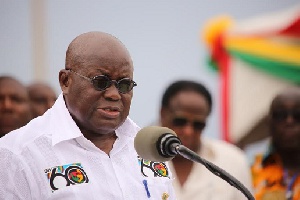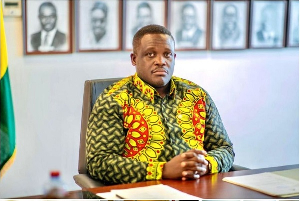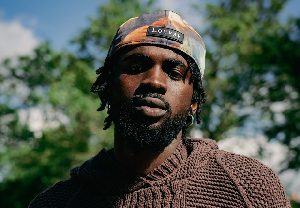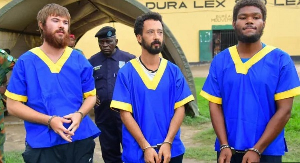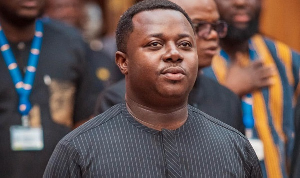President Nana Akufo-Addo has condemned collusion by contractors and public servants in the implementation of shoddy works in the country that prevents Ghana from getting to where it ought to be.
He bemoaned the prevailing Ghanaian work culture which pays very little attention to time, quality of work and productivity.
The President further expressed concern about some unhelpful work place attitudes which are inimical to the country’s collective effort to accelerated development.
“How come that old, very old classroom block withstands storm and heavy rainfall, while the roofs of nearby newly-built ones are ripped-off regularly? How come that we build roads that are expected to last at least five years and they do not make it through one rainy season before they fail and pot holes appear? he queried.
He accused workers and contractors of these roads of conspiring to deliver the shoddy work.
President Akufo-Addo made the observations in his maiden May Day Address at the National May Day Parade of organised labour at the Black Star Square in Accra.
The theme for this year’s programme was: ‘Ghana @60; Mobilising for Ghana’s Future through the Creation of Decent Jobs’.
He has asked Ghanaians to adopt a more professional attitude to their work culture in order to accelerate the development of the country.
He bemoaned the lackadaisical attitude section of the Ghanaian workforce attach to their work as well as others who have the penchant for delivering shoddy work at the expense of the much needed development of the country.
He emphasised that while government works at meeting the needs of its workforce, it is imperative that Ghanaians adopt a more productive attitude to work.
“When efforts are made to improve pay levels without commensurate improvement in productivity, the result, inevitability, point to macroeconomic instability for our country,” he stressed.
“We arrive at work late and then spend the first hour in prayer. We are clock watchers and leave in the middle of critical work because it is the official closing time. Everything comes to a stop when it rains and we seem to expect the rest of the world also stop.
"We have no respect for the hours set aside for work, we pray, we eat, we visit during working hours. We spend hours chatting on the telephone when customers are waiting to be served, thereby increasing our labour costs.
"We take a week off for every funeral and then wonder why we are not competitive", he added.
The President further expressed concern about the services often provided by our hospitality industry which he said “does not match up to that of our competitors and many of us have sadly come around to accept poor service as a norm”.
He also condemned the lack of responsibly of inclination towards protect government property.
According to him “if we are going to make the changes we all want, then we have to start with the change in attitudes to work”.
War on corruption and saving the public purse
The President also pledged his government’s commitment to fighting corruption.
To this effect he said the creation of the office of the special prosecutor to prosecute all corruption cases would help to enhance integrity and the rule of law.
In other reforms by government to safeguard the public purse, the President said a recent payroll audit conducted by the ministry of finance in the last two months has led to the suspension of some 26,589 workers salaries suspected to be ghost names.
“This means the that government stands to save the country over GHC433 million on this year’s budget alone by this exercise”, he stressed
Ghana has no reason to be poor
The Secretary-General of the Trade Unions Congress, Dr Yaw Baah, who pledged the unflinching support of labour in rallying around the leadership of the country to achieve accelerated growth and development, said Ghana needs to chart a new course towards accelerated development.
He emphasised that as the country celebrates its 60th anniversary, it would be important to reflect on the past and use the lessons therein to couch out the future the country aspires to achieve.
He recalled that at independence, in 1957, Ghana was beaming with hope such that “those who were celebrating and jubilating when Ghana achieved independence did so because they thought the lives of their children, their grandchildren and their great grand children would be better than theirs but their hopes were shattered within a decade or so after independence”.
The disappointment of many Ghanaians, he explained, stemmed from the fact that life for many has become something to endure because of the lack of basic necessities that makes life worthwhile.
“Ghanaians in some parts of our country still share water from guinea worm-infested ponds with their cattle, sheep, goats, chicken, pigs and dogs”.
A significant number of Ghanaians, he noted, sleep in the streets because they have no homes to go to at night after a hard day’s work.
Out of desperation, some young Ghanaians in search of greener pastures have tried to reach Europe through dangerous routes with many losing their lives in the process.
Country has failed economically
He further blamed the current socio-economic challenges facing the county to the failures in prudent economic management.
Joblessness among the youth, he said, remains the greatest challenge facing the country in spite of the country’s enormous wealth.
He lamented that after 60 years of independence, the significant number of Ghanaians cannot afford housing, education for their children, basic health care and care for themselves at old age.
He also bemoaned the phenomenon where a majority of children are still engaged in hazardous work to support themselves and families, including thousands of them who are forced into illegal mining activities across the country.
“This should not be the features of a very wealthy country like Ghana after 60 years of independence. Clearly, we have mismanaged our economy. We chose a certain path that has led us here. This is not where Ghana should be given our massive natural resources. Ghana has no reason to be counted among poor countries,” he emphasized.
These lapses notwithstanding, he acknowledged the progress the country has made over the period consolidating enviable democratic credentials among her peers on the continent.
“In spite of our challenges, we are still a model of democracy in Africa”.
He stressed that with the collaborative effort of government and organised labour, Ghana can begin to chart a new course to accelerate her development into a prosperous future.
“Mr President, we are counting on you to lead us into this future. We in organized labour would like to pledge our support for you and your government”, he added.
General News of Tuesday, 2 May 2017
Source: thefinderonline.com

